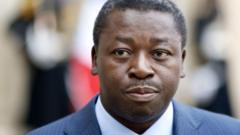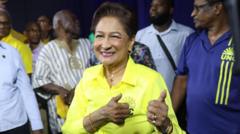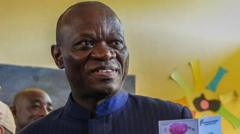Faure Gnassingbé has assumed a powerful new role following constitutional reforms that could pave the way for his lifelong leadership, leading to criticisms of an 'institutional coup.'
**Togo's Leadership Transformation: A Path to Lifelong Rule?**

**Togo's Leadership Transformation: A Path to Lifelong Rule?**
New constitutional changes enable Faure Gnassingbé's indefinite tenure as Togo's leader.
In a significant move that raises questions about democratic governance in Togo, President Faure Gnassingbé has been inaugurated as the "President of the Council of Ministers," which is now considered the highest position in the government's executive branch without an official term limit. This change comes in the wake of a constitutional reform process that abolished presidential elections, shifting the country to a parliamentary system.
Critics, particularly from the opposition, assert that these alterations are strategically designed to permit Gnassingbé to maintain power indefinitely. His family has been at the helm of Togo's leadership for 58 years, with Faure taking over from his father, Gnassingbé Eyadéma, in 2005 after nearly 40 years of his rule.
The shifts were introduced following the approval of a controversial new constitution by lawmakers last year, which has been denounced by opposition figures as an “institutional coup d'état.” Initially faced with vast public opposition, the Gnassingbé government chose to advance with these constitutional changes, positioning Gnassingbé in an even more entrenched power structure through his new title.
The upcoming municipal elections in July will be the first conducted under the new constitution, marking a pivotal moment as the country navigates this transition from a presidential to a parliamentary system. While the role of the republic's president has now been designated as merely ceremonial, political analysts indicate that the real influence of power remains firmly in Gnassingbé's hands following his ascension as council president. Notably, his party, the Union for the Republic, secured an overwhelming victory in last year's parliamentary elections, claiming 108 out of 113 seats in the National Assembly.
Stay informed with ongoing developments in Togo's political landscape and its implications for the region's stability.
Critics, particularly from the opposition, assert that these alterations are strategically designed to permit Gnassingbé to maintain power indefinitely. His family has been at the helm of Togo's leadership for 58 years, with Faure taking over from his father, Gnassingbé Eyadéma, in 2005 after nearly 40 years of his rule.
The shifts were introduced following the approval of a controversial new constitution by lawmakers last year, which has been denounced by opposition figures as an “institutional coup d'état.” Initially faced with vast public opposition, the Gnassingbé government chose to advance with these constitutional changes, positioning Gnassingbé in an even more entrenched power structure through his new title.
The upcoming municipal elections in July will be the first conducted under the new constitution, marking a pivotal moment as the country navigates this transition from a presidential to a parliamentary system. While the role of the republic's president has now been designated as merely ceremonial, political analysts indicate that the real influence of power remains firmly in Gnassingbé's hands following his ascension as council president. Notably, his party, the Union for the Republic, secured an overwhelming victory in last year's parliamentary elections, claiming 108 out of 113 seats in the National Assembly.
Stay informed with ongoing developments in Togo's political landscape and its implications for the region's stability.



















